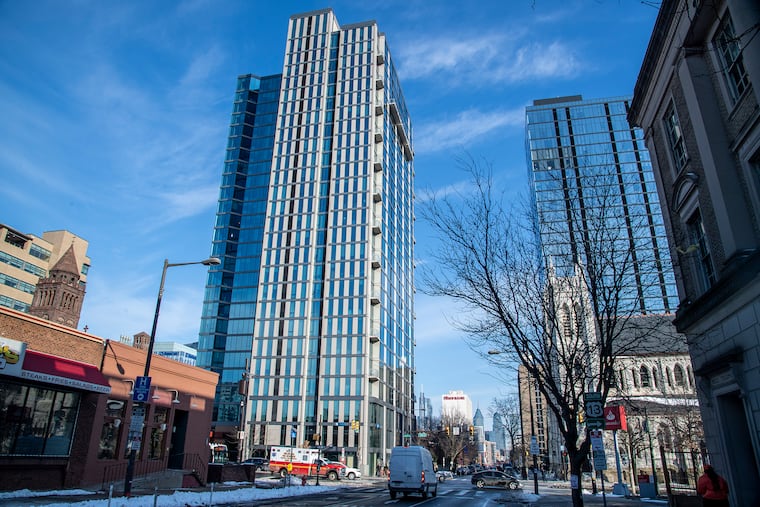Chicago and N.Y. development firms plan new lab-and-office tower in U. City life-science hotbed
The announcement comes amid surging demand from companies seeking lab space to develop and commercialize cell-therapy treatments.

A consortium of Chicago- and New York-based real estate developers plans to acquire land at 38th and Chestnut Streets to build high-tech offices and labs in a bet that University City will remain an epicenter for the nation’s booming life-sciences industries.
Sterling Bay and Harrison Street of Chicago and New York-based Botanic Properties are forming a venture to acquire the 3801 Chestnut St. site, currently home to Abner’s Cheesesteaks and other shops, for development into a 13-story, 310,000-square-foot office tower for life-science tenants, the companies said ahead of a planned announcement of the tie-up Tuesday.
The announcement comes amid surging demand from companies seeking lab space to develop and commercialize cell-therapy innovations and other cutting-edge treatments, many of them based on research conducted at area institutions such as the University of Pennsylvania, Drexel University, and Children’s Hospital of Philadelphia.
» READ MORE: Spark Therapeutics to build $575 million gene therapy center on Drexel campus at 30th & Chestnut
“Philadelphia’s academic institutions are some of the most innovative research institutions in the world, and so we are just very excited to have the opportunity to develop a facility in what we consider to be one of the strongest markets for life-sciences growth,” Suzet McKinney, Sterling Bay’s director of life sciences, said in an interview Monday.
Sterling Bay’s other current projects include the Lincoln Yards development in Chicago, a $6 billion district of shops, homes, and parks at a former industrial site along a branch of the Chicago River.
Venture investment in life-sciences companies across the Philadelphia region nearly tripled from $430 million in 2000 to $1.5 billion in 2021, according to a report from biotech news tracker Big4Bio.
That surge in funding is helping companies form and expand, especially in University City, even as reduced need for office real estate due to the coronavirus hurts occupancy levels in other parts of the region.
Office vacancies averaged 9.4% in University City during the last three months of 2021, compared with 17.5% in Center City, according to a report from real estate services firm Newmark.
Nearly 1.3 million square feet of new office space, most of it geared toward life-science tenants, is under construction in University City, with completion slated for this year and next, according to Newmark. That’s a 28% increase over the area’s current inventory of about 4.7 million square feet.
“If you need lab space right now, you have no options,” said Jim Egan, executive managing director with Newmark in Philadelphia. “So these buildings are being built to meet that demand, which I think will continue to be there.”
Projects include the West Tower of the Schuylkill Yards project at 3025 John F. Kennedy Blvd., where developer Brandywine Realty Trust is building shops, apartments, and 200,000 square feet of commercial space including labs, as well as Wexford Science & Technology’s 400,000-square-foot One uCity Square at 37th and Warren Streets, southwest of Lancaster Avenue.
Spark Therapeutics, a gene therapy company owned by Swiss biotechnology giant Roche, also plans to build a 500,000-square-foot laboratory and manufacturing center on Drexel University’s campus at 30th and Chestnut Streets.
Landlords are also scrambling to retrofit existing office space to accommodate life-science labs. Brandywine, for example, last month finished turning a 54,000-square-foot section of the Cira Centre tower near 30th Street Station into lab and research space, all of which has already been leased, Egan said.
Keystone Property Group, meanwhile, has transformed sections of its Curtis building across from Washington Square in Center City into life-science labs and offices for such tenants as brain cancer vaccine developer Imvax Inc. and Vivodyne.
The University City-centered biotech boom is also being felt outside Philadelphia itself, with projects such as developer J. Brian O’Neill’s complex of buildings in and around King of Prussia that are being retrofitted into what he calls the Center for Breakthrough Medicines. Last month , the complex received an infusion of $350 million from SK Inc., a publicly traded South Korean conglomerate that specializes in semiconductors, energy, and now health care.
Mark Burkemper, senior managing director at Harrison Street, said his company had been exploring opportunities in Philadelphia for several years and planned to pursue additional projects here with Sterling Bay and Botanic, which specializes in life-science projects.
Construction of the 3801 Chestnut St. lab-and-office building is slated to begin during the first three months of 2023, with completion anticipated in mid-2025.
“We already believe the demand is in this location,” said Burkemper.
He declined to share financial details of the venture or its acquisition price for the 33,400-square-foot 3801 Chestnut St. property.
The parcel is currently owned by Theodore F. Pagano, records show. Pagano did not return a phone message left for him at the Club Risque strip club in South Philadelphia, which he also owns.